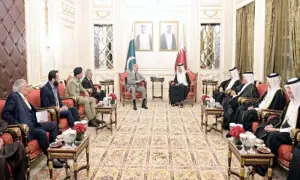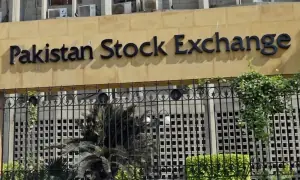Pakistan has to give assurance on financing balance of payments gap: IMF
3 min readKARACHI: Pakistan will be required to give an assurance that its balance of payments deficit is fully financed for the fiscal year ending in June to unlock the next tranche of IMF funding, the fund’s resident representative said on Monday.
The funding is critical for the South Asian economy, which is facing a balance of payments crisis, with its central bank foreign exchange reserves dropping to levels barely able to cover four weeks of imports.
The International Monetary Fund has been negotiating with Islamabad since early last month to clear its ninth review, which if approved by the board will issue $1.1 billion of a $6.5 billion bailout agreed in 2019.
That bailout ends at the close of this fiscal year, which concludes June 30.
Finance Minister Ishaq Dar had said last week that the external financing assurance was not one of the IMF’s conditions for clearance of the funding.
“All IMF programme reviews require firm and credible assurances that there is sufficient financing to ensure that the borrowing member’s balance of payments is fully financed … over the remainder of the programme,” the fund’s Esther Perez Ruiz told Reuters in an e-mailed response to questions.
“Pakistan is no exception.”
Pakistan has completed almost all other measures needed except for the external financing requirement, officials say.
Dar said last week that Pakistan will need $5 billion external financing to close its financing gap this fiscal year ending June 30, adding the IMF believed it should be $7 billion.
Longtime ally China is the only country that has so far committed a refinancing of $2 billion. Out of that $1.2 billion has already been credited to Pakistan’s central bank.
Dar said hoped more external financing will be coming as Pakistan signs the IMF deal this week. The IMF has not given any timeline.
International bonds firm
Pakistan’s international bonds rose on Monday - broadly in line with other smaller, riskier emerging markets. Pakistan’s 2026 bond added as much as 1.2 cents to trade at just over 44 cents in the dollar, Tradeweb data showed.
Some analysts were upbeat on Pakistan’s immediate prospects.
“After fulfilling a long ‘to-do’ list in an effort to get the IMF program back on track, we believe the resumption of Pakistan’s EFF (Extended Fund Facility) program is imminent,” said Anna Friedemann at Deutsche Bank in London.
She, however, added that a restructuring at some point was “almost certain”.
The rupee, whose value has been depreciating amid delays in the funding deal with the IMF, also rose in interbank trading on Monday, extending a recovery from Thursday’s 6% drop against the dollar.
“The exchange rate has moved significantly in recent days, which has narrowed the informal FX market premium bringing the rates closer together in a similar way to that seen around January 26,” the IMF Luiz said in her email.
“This should result from the unconstrained operation of the foreign exchange rate market.”
On Jan 25, foreign exchange companies removed a cap on the currency, saying it caused “artificial” distortions for an economy in desperate need of IMF help.
Ruiz noted that the difference in foreign exchange rates between the open and informal markets has been very damaging for Pakistan, resulting in shortages of foreign exchange and consequently imported goods.
She also said that Pakistani authorities were also planning a permanent power surcharge on consumers to address the energy sector’s debt.
“The power sector CD [circular debt] flow for FY23 is expected to largely overshoot expectations under the EFF-supported program by a sizable margin due to a significant under-collection from delays in regular tariff adjustments, declining recovery rates, and unbudgeted subsidies,” she said.
For the latest news, follow us on Twitter @Aaj_Urdu. We are also on Facebook, Instagram and YouTube.


























Comments are closed on this story.